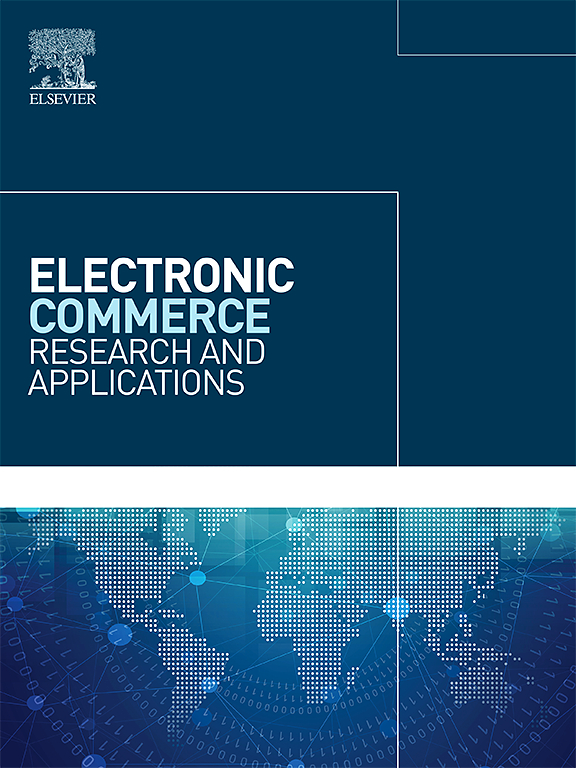Personalize it, no return: Nudging online consumers towards product personalization that makes the product non-returnable with herd instinct and regret nudges
IF 5.9
3区 管理学
Q1 BUSINESS
Electronic Commerce Research and Applications
Pub Date : 2025-06-13
DOI:10.1016/j.elerap.2025.101525
引用次数: 0
Abstract
Massive ecommerce returns incur considerable return costs for online sellers, erode their competitiveness, burden their returns systems, and damage the natural environment. Reducing ecommerce returns can mitigate these negative consequences. Since most online sellers adopt a no-return policy for personalized products, inducing consumers to personalize more products should be an effective way for these sellers to reduce ecommerce returns. This article focuses on how online sellers use a herd instinct nudge and a regret nudge to induce consumers to use a product personalization service to reduce ecommerce returns. We also studied the effects of the nudges on several pivotal consumer perceptions and affects. A two-factor (a herd instinct nudge vs. no herd instinct nudge; a regret nudge vs. no regret nudge), between-subject experiment was conducted. This research revealed that both using a herd instinct nudge and using a regret nudge can lead to more consumer product personalization behaviors. Both nudges can make consumers perceive the service more valuable. Compared to a regret nudge, a herd instinct nudge should be a more superior method to induce consumer to use the service because it can increase consumer satisfaction with the seller but did not have a significant influence on consumer perceived threat to decision-making freedom. No interaction effect was found between the two nudges.
个性化,无回报:通过从众本能和后悔推动,将在线消费者推向产品个性化,使产品不可退货
大量的电子商务退货给在线卖家带来了可观的退货成本,削弱了他们的竞争力,给他们的退货系统带来了负担,并破坏了自然环境。减少电子商务的回报可以减轻这些负面影响。由于大多数在线卖家对个性化产品采取不退货政策,诱导消费者个性化更多的产品应该是这些卖家减少电商退货的有效途径。这篇文章的重点是在线卖家如何使用群体本能和后悔推动来诱导消费者使用产品个性化服务来减少电子商务的回报。我们还研究了轻推对几个关键消费者认知和影响的影响。双重因素(群体本能推动vs.没有群体本能推动;进行了后悔轻推与不后悔轻推的受试者间实验。这项研究表明,使用群体本能推动和使用后悔推动都可以导致更多的消费者产品个性化行为。这两种推动都能让消费者觉得服务更有价值。与后悔推动相比,群体本能推动应该是一种更优越的诱导消费者使用服务的方法,因为它可以提高消费者对卖家的满意度,但对消费者感知到的对决策自由的威胁没有显著影响。两种推力之间没有相互作用。
本文章由计算机程序翻译,如有差异,请以英文原文为准。
求助全文
约1分钟内获得全文
求助全文
来源期刊

Electronic Commerce Research and Applications
工程技术-计算机:跨学科应用
CiteScore
10.10
自引率
8.30%
发文量
97
审稿时长
63 days
期刊介绍:
Electronic Commerce Research and Applications aims to create and disseminate enduring knowledge for the fast-changing e-commerce environment. A major dilemma in e-commerce research is how to achieve a balance between the currency and the life span of knowledge.
Electronic Commerce Research and Applications will contribute to the establishment of a research community to create the knowledge, technology, theory, and applications for the development of electronic commerce. This is targeted at the intersection of technological potential and business aims.
 求助内容:
求助内容: 应助结果提醒方式:
应助结果提醒方式:


